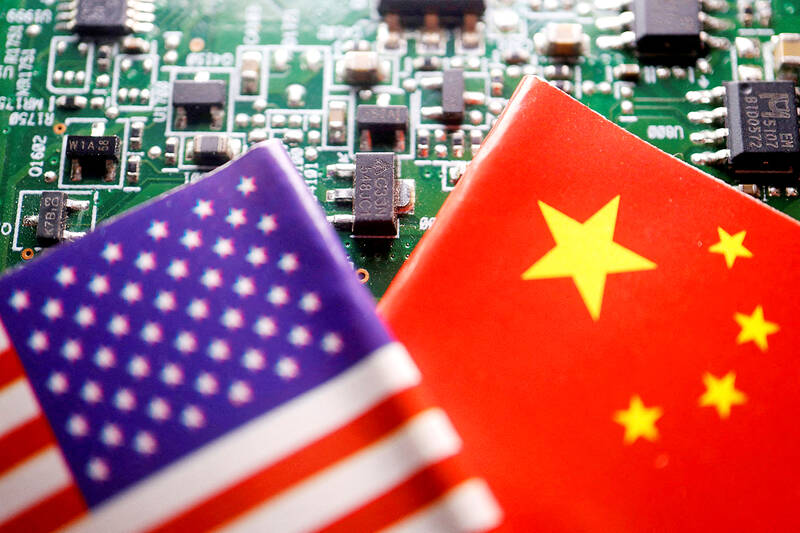The US Department of Commerce on Friday issued its final rules to prevent semiconductor manufacturing subsidies from being used by China and other countries deemed to pose US national security concerns.
The regulations are the final hurdle before the administration of US President Joe Biden can begin awarding US$39 billion in subsidies for semiconductor production. The landmark Creating Helpful Incentives to Produce Semiconductors (CHIPS) and Science Act provides US$52.7 billion for US semiconductor production, research and workforce development.
First proposed in March, the regulations set “guardrails” by limiting recipients of US funding from investing in expanding chip manufacturing in countries of concern such as China and Russia, and limit recipients of incentive funds from engaging in joint research or technology licensing efforts with foreign entities of concern.

Photo: Reuters
In October last year, the department issued new export controls to cut China off from certain semiconductor chips made with US equipment in its bid to slow Beijing’s technological and military advances.
“We have to be absolutely vigilant that not a penny of this helps China to get ahead of us,” US Secretary of Commerce Gina Raimondo told the US Congress on Tuesday.
If funding recipients contravene restrictions, the department can claw back federal awards.
Raimondo told Congress that she is working as fast as possible to get awards approved.
“I feel the pressure,” Raimondo said. “We are behind, but it is more important that we get it right.”
The regulations prohibit funding recipients from significantly expanding semiconductor manufacturing capacity in foreign countries of concern for 10 years. They also restrict recipients from some joint research or technology licensing efforts with foreign entities of concern, but allow for international standards, patent licensing, and utilizing foundry and packaging services.
The rules prohibit material expansion of semiconductor manufacturing capacity for leading-edge and advanced facilities in foreign countries of concern for 10 years.
They also clarify that wafer production is included within semiconductor manufacturing.
The final rule ties expanded semiconductor manufacturing capacity to adding clean-room or other physical space, defining material expansions as increasing production capacity by more than 5 percent.
The rule prohibits recipients from adding new clean-room space or production lines that result in expanding a facility’s production capacity beyond 10 percent.
It also classifies some semiconductors as critical to national security, triggering tighter restrictions, including quantum computing current-generation and mature-node chips, in radiation-intensive environments and for other specialized military capabilities.

CHAOS: Iranians took to the streets playing celebratory music after reports of Khamenei’s death on Saturday, while mourners also gathered in Tehran yesterday Iranian Supreme Leader Ayatollah Ali Khamenei was killed in a major attack on Iran launched by Israel and the US, throwing the future of the Islamic republic into doubt and raising the risk of regional instability. Iranian state television and the state-run IRNA news agency announced the 86-year-old’s death early yesterday. US President Donald Trump said it gave Iranians their “greatest chance” to “take back” their country. The announcements came after a joint US and Israeli aerial bombardment that targeted Iranian military and governmental sites. Trump said the “heavy and pinpoint bombing” would continue through the week or as long

TRUST: The KMT said it respected the US’ timing and considerations, and hoped it would continue to honor its commitments to helping Taiwan bolster its defenses and deterrence US President Donald Trump is delaying a multibillion-dollar arms sale to Taiwan to ensure his visit to Beijing is successful, a New York Times report said. The weapons sales package has stalled in the US Department of State, the report said, citing US officials it did not identify. The White House has told agencies not to push forward ahead of Trump’s meeting with Chinese President Xi Jinping (習近平), it said. The two last month held a phone call to discuss trade and geopolitical flashpoints ahead of the summit. Xi raised the Taiwan issue and urged the US to handle arms sales to

State-run CPC Corp, Taiwan (CPC, 台灣中油) yesterday said that it had confirmed on Saturday night with its liquefied natural gas (LNG) and crude oil suppliers that shipments are proceeding as scheduled and that domestic supplies remain unaffected. The CPC yesterday announced the gasoline and diesel prices will rise by NT$0.2 and NT$0.4 per liter, respectively, starting Monday, citing Middle East tensions and blizzards in the eastern United States. CPC also iterated it has been reducing the proportion of crude oil imports from the Middle East and diversifying its supply sources in the past few years in response to geopolitical risks, expanding

Pro-democracy media tycoon Jimmy Lai’s (黎智英) fraud conviction and prison sentence were yesterday overturned by a Hong Kong court, in a surprise legal decision that comes soon after Lai was jailed for 20 years on a separate national security charge. Judges Jeremy Poon (潘兆初), Anthea Pang (彭寶琴) and Derek Pang (彭偉昌) said in the judgement that they allowed the appeal from Lai, and another defendant in the case, to proceed, as a lower court judge had “erred.” “The Court of Appeal gave them leave to appeal against their conviction, allowed their appeals, quashed the convictions and set aside the sentences,” the judges